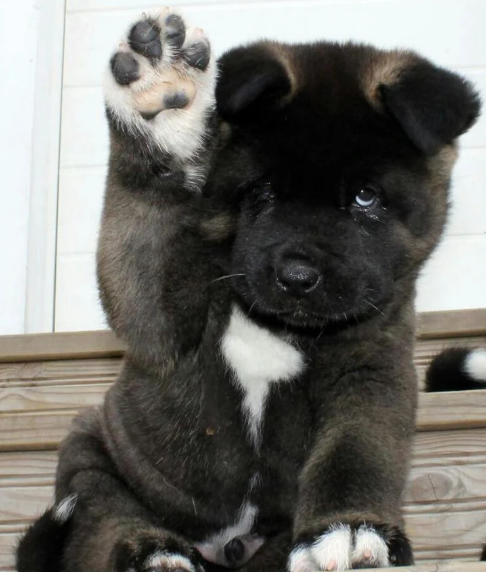The Akita Dog Breed: A Comprehensive Guide. The Akita is a noble and powerful dog breed with a rich history and a strong presence in the United States. Originally from Japan, these dogs are known for their loyalty, intelligence, and striking appearance. Whether you’re considering adopting an Akita or simply want to learn more about this magnificent breed, this guide covers everything from history and adoption costs to grooming, nutrition, and why they make great family pets.
History of the Akita Breed
The Akita is one of the oldest and most revered dog breeds in Japan, with roots tracing back over 1,000 years. The breed was originally developed in the Akita Prefecture of northern Japan, where they were bred for hunting large game such as boars, deer, and even bears. Their strength, intelligence, and fearless nature made them ideal hunters.
In the early 20th century, the Akita breed faced near extinction due to war and economic hardship in Japan. However, efforts were made to preserve and refine the breed, leading to the Akita Inu (Japanese Akita) and the American Akita (which is larger and more robust).
One of the most famous Akitas in history is Hachikō, a loyal dog who waited for his deceased owner at a train station every day for nearly 10 years. His story symbolizes the Akita’s unwavering devotion, and a statue in his honor stands at Shibuya Station in Tokyo.
Today, Akitas are beloved pets worldwide and are known for their loyalty, intelligence, and dignified demeanor.
Adoption Costs and Where to Find an Akita
If you’re looking to adopt an Akita, there are several ways to do so:
Adoption from Shelters or Rescues
Many Akitas end up in shelters due to their high energy levels and need for experienced owners. Adopting from a rescue group or shelter is a great way to provide a loving home to a dog in need. Adoption fees generally range from $150 to $500, depending on the organization and the dog’s age, medical history, and location.
Buying from a Breeder
If you prefer a purebred Akita puppy, purchasing from a reputable breeder is another option. Akita puppies from responsible breeders typically cost between $1,000 and $3,500, depending on lineage, breeder reputation, and location. When buying from a breeder, ensure they follow ethical breeding practices, perform health screenings, and socialize their puppies properly.
Where Are Akitas Most Commonly Found in the U.S.?
Akitas are more commonly found in states with colder climates, such as:
-
Alaska
-
Washington
-
Colorado
-
Minnesota
-
Maine
 These areas suit Akitas because of their thick double coats, which make them well-adapted to colder weather. However, they can also be found across the country, from California to Florida, with responsible owners ensuring they are well cared for in warmer climates.
These areas suit Akitas because of their thick double coats, which make them well-adapted to colder weather. However, they can also be found across the country, from California to Florida, with responsible owners ensuring they are well cared for in warmer climates.
Caring for an Akita Puppy
Bringing home an Akita puppy is exciting but requires careful preparation. Here are the essential aspects of puppy care:
Training & Socialization
-
Akitas are intelligent but independent, making dog training essential from an early age.
-
They respond well to positive reinforcement but require a firm, consistent leader.
-
Early socialization with other dogs, animals, and people is crucial to prevent aggression or territorial behavior.
Exercise & Play
-
Akitas need at least 1-2 hours of exercise daily to stay happy and healthy.
-
Daily walks, play sessions, and mental stimulation (like puzzle toys) are important.
-
They enjoy activities like hiking, agility training, and playing fetch.
Crate Training & Housebreaking
-
Akitas can be house-trained relatively quickly with consistency.
-
Crate training is recommended to provide them with a safe space and help with potty training.
Relocating an Akita
If you need to relocate an Akita…whether by car or plane…proper planning is required:
Car Travel
-
Use a large, well-ventilated crate or a harness to secure them in the car.
-
Akitas can get anxious in the car, so short trips first can help them adjust.
-
Never leave an Akita alone in a hot car, as they are prone to overheating.
Air Travel
-
If flying, check airline regulations for large dog breeds.
-
Use an airline-approved crate with plenty of ventilation.
-
Book direct flights to reduce stress and limit travel time.

Did you find this article useful? Would you like 100% free access to more articles like these, and free access to over 5,000 vetted pet care service professionals throughout the United States? Sign up here for a free Petworks account, and take 10% off your first booking, on us!
Veterinary Care and Health Concerns
Akitas are generally healthy dogs, but they are prone to certain conditions:
Common Health Issues
-
Hip Dysplasia – A genetic condition affecting joint function.
-
Progressive Retinal Atrophy (PRA) – Can lead to blindness over time.
-
Hypothyroidism – Causes weight gain, lethargy, and skin issues.
-
Bloat (Gastric Torsion) – A life-threatening condition where the stomach twists.
Vet Care Costs
-
Routine Checkups: $50 – $200 per visit
-
Vaccinations: $75 – $150 annually
-
Spaying/Neutering: $200 – $500
-
Emergency Care: Can exceed $1,000 if surgery is needed
Regular vet checkups and preventive care can help avoid many serious health issues.
Dog Nutrition: What to Feed an Akita
Akitas require a high-quality diet rich in protein and essential nutrients.
Dietary Recommendations
-
High-protein diet (at least 25% protein from meat sources)
-
Healthy fats for coat health (Omega-3 and Omega-6)
-
Grain-free or whole-grain diets, depending on the dog’s sensitivity
-
Avoid fillers like corn, soy, and artificial preservatives
Feeding Schedule
-
Puppies: 3-4 meals per day
-
Adults: 2 meals per day
-
Avoid feeding immediately before or after exercise to prevent bloat.
Grooming an Akita
Akitas have a thick double coat that requires regular maintenance.
Brushing
-
Brush at least twice a week to prevent matting and control shedding.
-
During shedding seasons (spring and fall), daily brushing is recommended.
Bathing
-
Bathe every 6-8 weeks unless they get particularly dirty.
-
Use a dog-friendly shampoo to maintain coat health.
Nail Trimming & Ear Cleaning
-
Trim nails every 3-4 weeks to prevent discomfort.
-
Clean ears regularly to prevent infections.
Why Akitas Make Great Family Pets
Akitas are loyal, protective, and affectionate with their families. Here’s why they’re great pets:
Loyalty & Devotion
-
Akitas are known for their deep bond with their owners.
-
They are protective but not overly aggressive when properly trained.
Good with Children
-
With early socialization, they can be gentle and patient with kids.
-
Always supervise interactions between an Akita and young children.
Intelligent & Trainable
-
They are smart and capable of learning commands quickly.
-
Their independent nature requires a confident owner who can establish leadership.
Fun Facts About Akitas
-
Akitas were once exclusively owned by Japanese royalty.
-
Helen Keller brought the first Akita to the U.S. in 1937 as a gift from Japan.
-
They have webbed toes, which help them walk on snow.
-
Akitas rarely bark, but they “talk” through grumbles, groans, and other vocalizations.
-
They are naturally clean dogs and often groom themselves like cats.
 Is an Akita Right for You?
Is an Akita Right for You?
Owning an Akita is a rewarding but demanding experience. They are best suited for experienced dog owners who can provide firm training, proper socialization, and plenty of exercise. If you’re looking for a loyal, intelligent, and protective companion, the Akita might be the perfect dog for you.
Would you consider adopting an Akita, or do you already have one?
 In 2021, Dr. Marty Goldstein DVM joined the pet care platform Petworks as an advisor in its Animal Nutrition care division. Dr Marty Nature’s Blend is on a mission to help your pets live their healthiest lives possible. Dr. Marty’s pet nutrition expertise and guidance has helped Petworks evolve and become the preeminent animal and pet nutrition consultation service for pet parents in North America.
In 2021, Dr. Marty Goldstein DVM joined the pet care platform Petworks as an advisor in its Animal Nutrition care division. Dr Marty Nature’s Blend is on a mission to help your pets live their healthiest lives possible. Dr. Marty’s pet nutrition expertise and guidance has helped Petworks evolve and become the preeminent animal and pet nutrition consultation service for pet parents in North America.
 In 2022, Blue Buffalo Founder Bill Bishop Jr. joined Petworks as Senior Advisor in our Animal Nutrition Care Division. Bill brings his extensive expertise in pet food innovation and business leadership. His guidance helps Petworks enhance our pet nutrition service offerings, helping to ensure that pet parents throughout the world receive trusted, science-backed nutritional support for their dogs, cats, and animals.
In 2022, Blue Buffalo Founder Bill Bishop Jr. joined Petworks as Senior Advisor in our Animal Nutrition Care Division. Bill brings his extensive expertise in pet food innovation and business leadership. His guidance helps Petworks enhance our pet nutrition service offerings, helping to ensure that pet parents throughout the world receive trusted, science-backed nutritional support for their dogs, cats, and animals.
About The Author
 Petworks Co-Founder Kevin Kinyon is a life-long animal lover who works tirelessly to improve the lives of pets and their parents. Human and animal qualities he values most are integrity, humor, and empathy.
Petworks Co-Founder Kevin Kinyon is a life-long animal lover who works tirelessly to improve the lives of pets and their parents. Human and animal qualities he values most are integrity, humor, and empathy.


